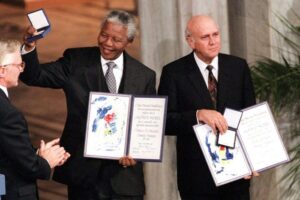The book describes prison life on Robben Island marked by the cruelty of guards, heavy labour (spending entire day breaking rock into gravel) and uninhabitable living conditions (a damp concrete cell 8 ft by 7 ft). With no black warders and no white prisoners, Robben Island became “the harshest, most iron-fisted outpost in the South African penal system.” Mandela remained an activist even in prison, organizing strikes which led to improvement in living conditions of the prisoners. Seen as a threat, there were plans to assassinate him but he survived. He also used this time in prison to teach others, pursue LLB studies and also write clandestine memoirs, which were made part of this book. He thrice got offers to be released but rejected them each time in deference to his larger values. Later he is transferred to the easier Pollsmoor prison and his wife Winnie visits him. He notes that it has been 21 years since holding his wife’s hand.
As the violence in the country worsened, and economy collapsed, the government came under heavy international pressure to release Mandela. Mandela, now in solitary confinement, also realized it was time for both sides to talk to avoid an outright war, where the blacks will hardly stand a chance against the military strength of the apartheid government. The new moderate President, De Klerk, released him unconditionally in 1990. Reporters asked him whether he hates whites to which he replied he hates the system not white people, and that whites will play a critical role in rebuilding the country. Together de Klerk and Mandela work towards the first free election in 1994 where ANC wins 62% vote and a National Unity government is formed.
Mandela ends the book here with a beautiful closing:
“I knew as well as I knew anything that the oppressor must be liberated just as surely the oppressed. A man who takes away another man’s freedom is (also) a prisoner of hatred, he is locked behind the bars of prejudice and narrow-mindedness…
I have walked that long road to freedom… But I can only rest for a moment, for with freedom comes responsibilities, and I dare not linger, for my long walk is not ended.”
Like any political leader, Mandela had his critics. Most notable criticism is that the big crises in South Africa of HIV/AIDS, land dispossession and high poverty (especially amongst blacks) were not effectively tackled under his presidentship. His friendship with known dictators like Fidel Castro, Gaddafi and Suharto, and more importantly his refusal to condemn their human rights violations, was also criticized. But these are minor spots in a largely unblemished life, career and legacy.
This is a long book, and one has to be patient while reading it. Some parts are slow and others too political for the regular user.







 This information will never be shared with third party
This information will never be shared with third party
Post A Comment
Want to join the discussion?Feel free to contribute!